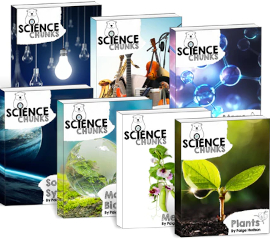Elemental Science’s Classic Series has been among my top picks for years. Now, Elemental Science makes it even easier for parents to pick and choose topics for science with their Science Chunks unit studies for children in kindergarten through sixth grade. You can purchase either individual units or pre-selected bundles of units for year-long courses. For the bundles, you also have the option of purchasing either PDFs or printed units. Thus far there are two complete bundles, Year A and Year B. Year C is under development.
The units vary in length from one to twelve lessons, with each lesson taking a week to complete. The units with only one lesson focus on the scientists Mendel and Pasteur. The unit on the solar system has 12 lessons, while most other units have four to six lessons. Elemental Science’s bundles combine units from a variety of scientific disciplines for a total of 36 weeks per bundle. You might instead select units that teach related science disciplines. (The two units on Mendel and Pasteur are available for free, so these might be a good way to try out Science Chunks.)
How the Unit Studies Work
There are suggestions for scheduling for one, two, three, or four days per week. Each lesson should take about one and a half to two hours over the span of a week. A To-Do List at the end of each lesson has check boxes next to essential and optional activities. This feature should help parents easily adjust their planning if their week becomes unexpectedly busy since they can quickly see what needs to be done and what can be skipped.
Like the Classic series, Science Chunks uses resource books such as DK Children’s Encyclopedia, Kingfisher Science Encyclopedia, Usborne Science Encyclopedia, Biology: Life as We Know It!, All About Light, and Gregor Mendel: The Friar Who Grew Peas. The encyclopedias are used for many weeks, and some are used for many units, so they are worth investing in. (The introductory information for each study states that you may use other resource books in place of the recommended ones.) Students will use either lapbooking or notebooking pages to record information. Each unit includes reproducible pages for both options. In addition, illustrated pages with lines for students to write definitions for vocabulary words can be used by older students while younger students might cut out the preprinted flashcards to work on vocabulary.
Each week’s lesson also includes hands-on projects, science demonstrations, or nature studies. Two templates are included in the appendix for students to record what they did or observed. One template has a large drawing space plus lines for students to explain “What I learned.” The other is a lab report form requiring more detail which should be better for older students. Students take a quiz at the end of each unit, found in the appendix. The answer key for quizzes is included in the last lesson plan of the unit.
Every unit study begins with teaching information on how it works and includes links to articles with further explanations of topics such as notebooking. The introductory information also tells which resource books are used with the unit study and provides materials lists. (Note that lapbooking requires more resources than notebooking since it involves more cutting, pasting, constructing, and decorating than notebooking.) Demonstrations and hands-on activities generally require easy-to-obtain resources that you might already have on hand.
The individual lessons have detailed plans telling which pages to read from the resource books—usually one book for younger students and a different one for older students. It’s up to parents to lead discussions regarding the reading if they wish. Optional books you can get from the library are listed if you want to go deeper. They also have specific instructions for vocabulary, lapbooking, and notebooking activities. The hands-on activities and demonstrations have instructions within the lesson plans that are simple to follow, but you are sometimes referred to a website for a more complete explanation. A few activities have a recording sheet in the appendix for students to use.
Science Chunks take a non-sectarian approach, although the resource books are secular.
Summary
Science Chunks provide structure and direction for parents who want to use living books as recommended by Charlotte Mason and classical educators. The inclusion of lapbooking or notebooking, along with work on vocabulary words, ensures that students are learning. And hands-on activities make the studies more interesting while engaging the attention of students who learn best by doing.









